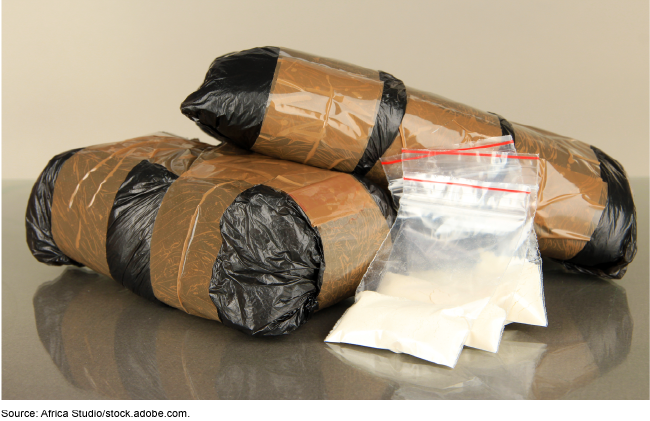Combatting Illicit Drugs: Improvements Needed for Coordinating Federal Investigations
Fast Facts
This Q&A report examines how the Drug Enforcement Administration and the Homeland Security Investigations agencies coordinate on drug investigations.
We found:
DEA authorized an average of over 4,000 HSI agents per year to participate in drug investigations in FY 2019-2023
DEA doesn't track the time it takes to process HSI agent requests to participate in drug investigations
DEA and HSI haven't implemented the agent training requirements they agreed to in 2021
We recommended that DEA establish timeliness goals for their processes to approve HSI agent requests, and that the organizations implement the agreed-upon training requirements.

Highlights
What GAO Found
To coordinate their investigative efforts, the Drug Enforcement Administration (DEA) and U.S. Immigration and Customs Enforcement (ICE) have entered into three agreements that outline how DEA can provide agents from ICE's Homeland Security Investigations (HSI) certain authorities to investigate violations of controlled substances laws contained in Title 21 of the U.S. Code (i.e., cross-designation under Title 21 authority). These agreements limit HSI agents' scope of investigative authority to the smuggling of controlled substances across U.S. international borders or through ports of entry. DEA has cross-designated an average of over 4,000 HSI agents per year during fiscal years 2019 through 2023. During those years, DEA did not deny cross-designation requests, according to DEA and HSI officials.
GAO found that while DEA and HSI reported concerns with the length of time it takes to process requests to cross-designate HSI agents, DEA has not established timeliness goals or tracked how much time its review processes take. Without establishing such goals and collecting and analyzing data on processing times, DEA cannot ensure it is making timely, data-driven decisions about the program.
GAO also found that DEA and HSI agreed to create two training modules, including a joint training, on their collaboration. The agencies have taken steps to implement the agreed-upon training but have not completed this effort as of February 2025. According to officials, this is due to disagreements over the content of the trainings. Although the agencies established a dispute-resolution mechanism, they have not used it to come to a consensus on training content. Until DEA and HSI resolve their disagreements and fully implement the two training modules, they cannot be assured that their agents are properly trained to collaborate on counternarcotics investigations.
Why GAO Did This Study
The federal government has identified the use of illicit drugs and misuse of prescription drugs, particularly opioids, as a persistent and long-standing risk to public health in the U.S. For example, the Centers for Disease Control and Prevention estimated that over 86,000 people died from a drug overdose in the 12-month period ending in September 2024. In addition to the significant loss of life, the illicit drug crisis places tremendous social and financial stress not only on drug users but also their families, workplaces, and all levels of government. To combat this crisis, the federal government has tasked DEA with leading U.S. efforts against illicit drug trafficking. In this role, DEA works with ICE within the Department of Homeland Security to investigate illicit drug activity with a connection to U.S. borders and ports of entry.
GAO was asked to examine how DEA and HSI coordinate on counternarcotics investigations. This report addresses (1) the extent to which DEA is following its process to review HSI agent requests to participate in counternarcotics investigations, and (2) the extent to which DEA and HSI have implemented the provisions of their January 2021 agreement regarding training requirements.
To do this work, GAO analyzed DEA and HSI agreements, available training materials, and interviewed relevant DEA and HSI headquarters officials to report on their perspectives regarding the Title 21 cross-designation processes and progress in implementing the joint training requirements.
Recommendations
GAO is making three recommendations, including that DEA establish timeliness goals for its Title 21 cross-designation processes and that DEA and ICE collaborate to develop training as required by their January 2021 agreement.
Recommendations for Executive Action
| Agency Affected | Recommendation | Status |
|---|---|---|
| Drug Enforcement Administration | The DEA Administrator should (1) establish timeliness goals for the cross-designation processes in consultation with the Director of ICE, and (2) collect and analyze data on the time involved in the processes to assess its performance against the goals. (Recommendation 1) |
We will update the status of this recommendation when DEA provides its 180-day letter (expected in fall 2025).
|
| Drug Enforcement Administration | The DEA Administrator should work with the Director of ICE to develop and implement the two training modules in accordance with their January 2021 agreement, using agreed-upon dispute resolution mechanisms as appropriate. (Recommendation 2) |
We will update the status of this recommendation when DEA provides its 180-day letter (expected in fall 2025).
|
| United States Immigration and Customs Enforcement | The Director of ICE should work with the DEA Administrator to develop and implement the two training modules in accordance with their January 2021 agreement, using agreed-upon dispute resolution mechanisms as appropriate. (Recommendation 3) |
We will update the status of this recommendation when DHS provides its 180-day letter (expected in fall 2025).
|
